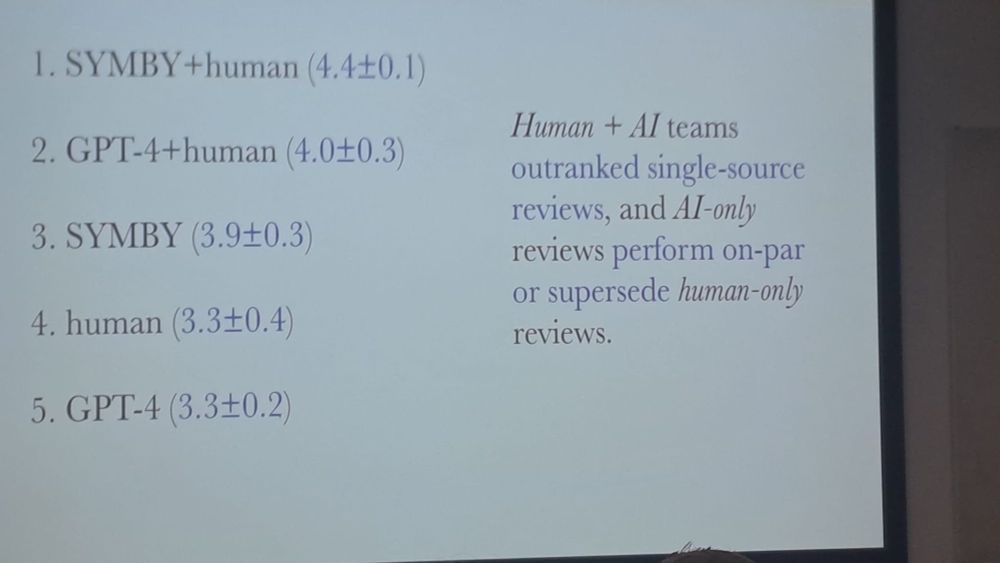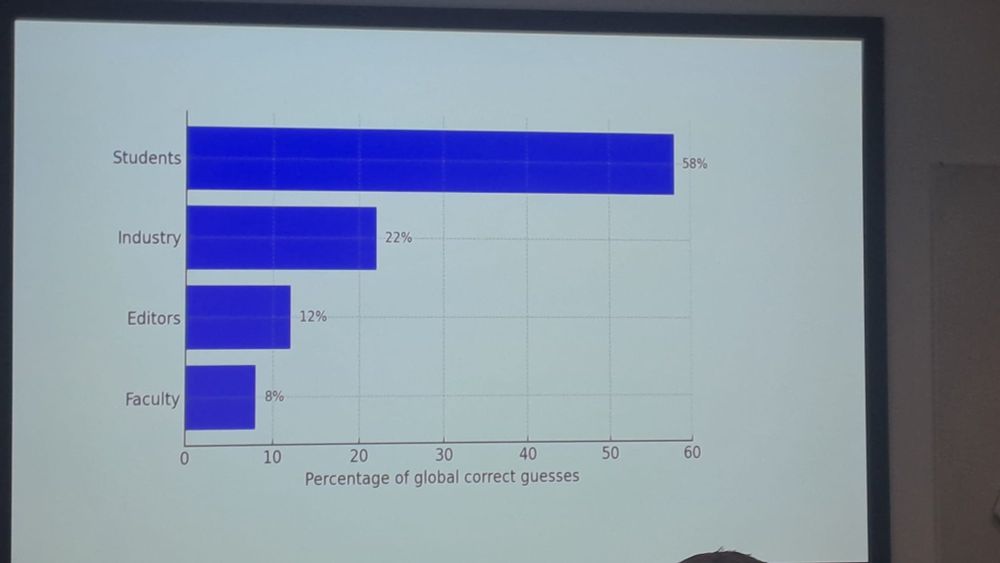
#AIMOS2025
@jamesheathers.bsky.social

#AIMOS2025
@jamesheathers.bsky.social
#AIMOS2025

#AIMOS2025
Send your studies on peer review there and be part of the future of science!
(CoI statement: I'm an ERC representative at MetaROR)
#PRC10

Send your studies on peer review there and be part of the future of science!
(CoI statement: I'm an ERC representative at MetaROR)
#PRC10
For strength of evidence: exceptional, compelling, convincing, solid, incomplete, & inadequate
For significance of findings: landmark, fundamental, important, valuable, & useful
#PRC10


For strength of evidence: exceptional, compelling, convincing, solid, incomplete, & inadequate
For significance of findings: landmark, fundamental, important, valuable, & useful
#PRC10
Involves authors, topic area, editorial decision, author characteristics (institutional prestige, region, gender), BoRE evaluations, review characteristics (length, sentiment, z-score, reviewer gender).
(Talk by Aaron Clauset)
#PRC10

Involves authors, topic area, editorial decision, author characteristics (institutional prestige, region, gender), BoRE evaluations, review characteristics (length, sentiment, z-score, reviewer gender).
(Talk by Aaron Clauset)
#PRC10
Abstracts typically improved, especially in big five medical journals. Evidence for the effectiveness of peer review?
#PRC10

Abstracts typically improved, especially in big five medical journals. Evidence for the effectiveness of peer review?
#PRC10
Most experienced PIs no longer have the best ranks in a distributed review system, but why that is remains unclear.
#PRC10

Most experienced PIs no longer have the best ranks in a distributed review system, but why that is remains unclear.
#PRC10
How do these differences come about? Fundamental differences between fields or chance and inertia?
#PRC10

How do these differences come about? Fundamental differences between fields or chance and inertia?
#PRC10

Good trigger to make an edit in a grant proposal I'm writing.
#PRC10

Good trigger to make an edit in a grant proposal I'm writing.
#PRC10

(Presentation by Yulin Yu)
Studies repurposing data are at higher risk of bias, so make sure to preregister them (check here for a template): research.tilburguniversity.edu/en/publicati...
#PRC10

(Presentation by Yulin Yu)
Studies repurposing data are at higher risk of bias, so make sure to preregister them (check here for a template): research.tilburguniversity.edu/en/publicati...
#PRC10
Findings:
- Much outcome switching but decrease over time
- Industry-sponsored trials most at risk
- Assessing outcome switching may seem trivial but is even hard for human coders
#PRC10




Findings:
- Much outcome switching but decrease over time
- Industry-sponsored trials most at risk
- Assessing outcome switching may seem trivial but is even hard for human coders
#PRC10
Are we going for low hanging fruit too much in research on peer review / publication?

Are we going for low hanging fruit too much in research on peer review / publication?
Markers of (dis)trust in science: Pay attention to email addresses (use of hotmail.com and underscores) and institutional affiliations (new and unknown organizations without verifiable addresses)
#PRC10

Markers of (dis)trust in science: Pay attention to email addresses (use of hotmail.com and underscores) and institutional affiliations (new and unknown organizations without verifiable addresses)
#PRC10
(Talk by Tim Kersjes from Springer Nature)
Could open review reports solve this issue?
#PRC10


(Talk by Tim Kersjes from Springer Nature)
Could open review reports solve this issue?
#PRC10
- Open reviews include more sentences, mainly involving suggestions and solutions indicating more constructive reviews
- Open reviews had higher information content scores
His explanation: There is more accountability in an open system
#PRC10

- Open reviews include more sentences, mainly involving suggestions and solutions indicating more constructive reviews
- Open reviews had higher information content scores
His explanation: There is more accountability in an open system
#PRC10
Shockingly low number for something that should be standard given that reviews are part of the scientific discourse and therefore should be public.
#PRC10

Shockingly low number for something that should be standard given that reviews are part of the scientific discourse and therefore should be public.
#PRC10
Talk by Isamme Al Fayyad on the first study from his PhD @maastrichtu.bsky.social
#PRC10

Talk by Isamme Al Fayyad on the first study from his PhD @maastrichtu.bsky.social
#PRC10
Ashia Livaudais from startup SymbyAI discussed this during a session on peer review at #metascience2025
Conclusion 1: the reviews of human-AI combinations were rated higher in quality than reviews of humans or AI by themselves

Ashia Livaudais from startup SymbyAI discussed this during a session on peer review at #metascience2025
Conclusion 1: the reviews of human-AI combinations were rated higher in quality than reviews of humans or AI by themselves



